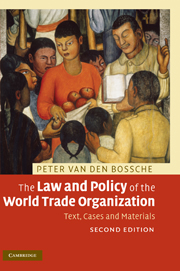Book contents
- Frontmatter
- Contents
- List of figures
- Preface to the first edition
- Preface to the second edition
- Table of cases
- Table of agreements
- 1 ECONOMIC GLOBALISATION AND THE LAW OF THE WTO
- 2 THE WORLD TRADE ORGANIZATION
- 3 WTO DISPUTE SETTLEMENT
- 4 PRINCIPLES OF NON-DISCRIMINATION
- 5 RULES ON MARKET ACCESS
- 6 RULES ON UNFAIR TRADE
- 7 TRADE LIBERALISATION VERSUS OTHER SOCIETAL VALUES AND INTERESTS
- 8 TOWARDS HARMONISATION OF NATIONAL REGULATION
- Epilogue
- Index
Preface to the first edition
Published online by Cambridge University Press: 05 June 2012
- Frontmatter
- Contents
- List of figures
- Preface to the first edition
- Preface to the second edition
- Table of cases
- Table of agreements
- 1 ECONOMIC GLOBALISATION AND THE LAW OF THE WTO
- 2 THE WORLD TRADE ORGANIZATION
- 3 WTO DISPUTE SETTLEMENT
- 4 PRINCIPLES OF NON-DISCRIMINATION
- 5 RULES ON MARKET ACCESS
- 6 RULES ON UNFAIR TRADE
- 7 TRADE LIBERALISATION VERSUS OTHER SOCIETAL VALUES AND INTERESTS
- 8 TOWARDS HARMONISATION OF NATIONAL REGULATION
- Epilogue
- Index
Summary
Since the entry into force of the WTO Agreement in January 1995, international trade law has developed from a technical backwater of international law to one of its most vibrant fields. Before 1995, international trade law was taught at few universities and was only of interest to a relatively small group of legal practitioners. Over the past decade, however, interest in this field of international law has increased dramatically. Students, academics, legal practitioners, advisers of businesses and NGOs, and officials of national governments and international organisations have woken up to its importance. Now, most universities give much attention to trade law in international law courses or offer specialised courses on WTO law.
Concrete plans for this book were first made on the eve of my departure from the WTO and return to academia at the end of 2001. For five years, I had the privilege to serve, during the seminal early days of the WTO and its law, as a senior legal advisor to the Appellate Body of the WTO.
This book is primarily a textbook for graduate and senior undergraduate students of law. However, it was also written with practising lawyers and policymakers, looking for an introduction to WTO law, in mind. The book covers both the institutional and the substantive law of the WTO. Chapter 1 is an introduction on whether economic globalisation and international trade are a bane or a blessing, on the need for WTO law, and on the main principles and sources of this law.
- Type
- Chapter
- Information
- The Law and Policy of the World Trade OrganizationText, Cases and Materials, pp. xiii - xviPublisher: Cambridge University PressPrint publication year: 2008



